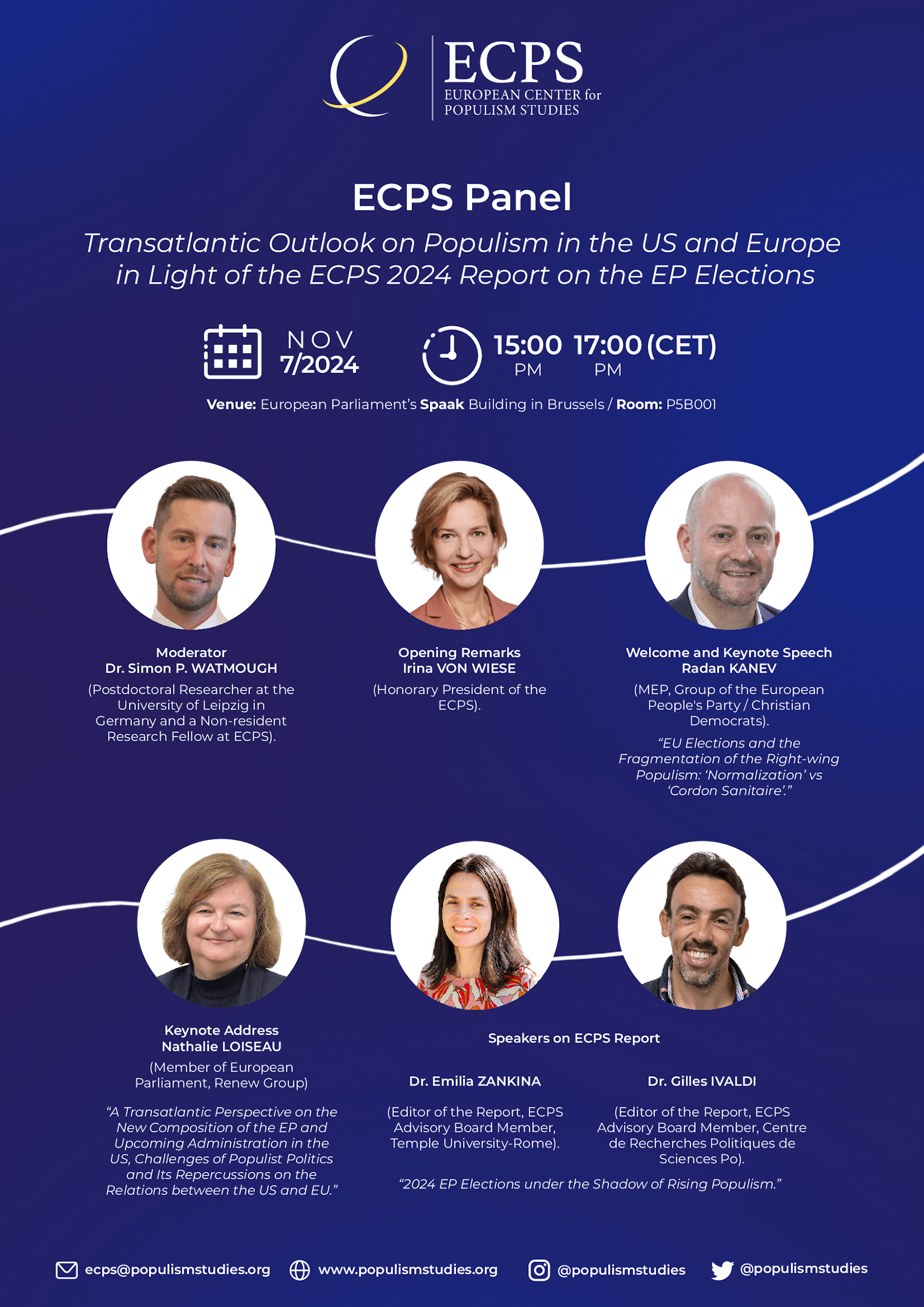Date/Time: November 7, 2024 — 15:00-17:00 CET.
Venue: European Parliament’s Spaak Building in Brussels / Room: P5B001.
This event is hosted by MEP Radan Kanev in cooperation with the European Center for Populism Studies (ECPS)
Moderator
Dr. Simon P. WATMOUGH (Postdoctoral Researcher at the University of Leipzig in Germany and a Non-resident Research Fellow at ECPS).
Speakers
“Opening Remarks” by Irina VON WIESE (Honorary President of the ECPS).
Welcome and Keynote Speech by Radan KANEV (Member of EP, EPP) on “EU Elections and the Fragmentation of the Right-wing Populism: ‘Normalisation’ vs ‘Cordon Sanitaire’.”
Keynote Address by Nathalie LOISEAU (Member of EP, Renew) on “A Transatlantic Perspective on the New Composition of the EP and Upcoming Administration in the US, Challenges of Populist Politics and Its Repercussions on the Relations between the US and EU.”
Presentation of the ECPS Report
“2024 EP Elections under the Shadow of Rising Populism,” by Dr. Emilia ZANKINA (Editor of the Report, ECPS Advisory Board Member, Temple University-Rome) and Dr. Gilles IVALDI (Editor of the Report, ECPS Advisory Board Member, Centre de Recherches Politiques de Sciences Po).

Objective
This event will examine the impact of populist politics on the 2024 European Parliament and US presidential elections. The ECPS report provides an analysis of populist party performance in the 2024 European elections, featuring insights from country experts on outcomes across the EU’s 27 member states. Additionally, it highlights the broader challenges that populist successes pose for the EU’s future. The report’s findings will be presented along with an analysis of the potential directions of the upcoming US administration, setting the stage for a discussion on the future of transatlantic relations.
Brief Biographies
Dr. Simon P. WATMOUGH is a postdoctoral researcher at the University of Leipzig in Germany and a non-resident research fellow in the research program on authoritarianism at ECPS. He was awarded his Ph.D. from the European University Institute in April 2017 with a dissertation titled “Democracy in the Shadow of the Deep State: Guardian Hybrid Regimes in Turkey and Thailand.” Dr. Watmough’s research interests sit at the intersection of global and comparative politics and include varieties of post-authoritarian states, the political sociology of the state, the role of the military in regime change, and the foreign policy of post-authoritarian states in the Middle East and Southeast Asia. His work has been published in Politics, Religion & Ideology, Urban Studies and Turkish Review. Since 2005, Dr. Watmough has taught international relations, diplomacy, foreign policy, and security studies, as well as Middle Eastern history at universities in Australia and Europe. In 2010–11 he was a research fellow at the Centre for Analysis of Social Exclusion (CASE) at the London School of Economics. He has held Visiting Scholar positions at Boğaziçi University in Istanbul (2012), the University of Queensland (2013), Chulalongkorn University in Bangkok, Thailand (2014) and the University of Graz (2017). In addition to his academic publications, he is also a regular contributor to The Conversation and other media outlets.
Irina VON WIESE was born in Germany, the daughter and granddaughter of Polish and Russian refugees. After completing her law studies in Cologne, Geneva and Munich, she obtained a scholarship to study at the Harvard Kennedy School where she gained a Master in Public Administration. Her subsequent legal training took her to Berlin, Brussels and Bangkok, and gave her a first insight into the plight of refugees and civil rights defenders across the globe. From 1997 to 2019, Irina lived and worked as a lawyer in private and public sector positions in London. During this time, she volunteered for human rights organisations, advising on migration policy and hosting refugees in her home for many years. In 2019, Irina was elected to represent UK Liberal Democrats in the European Parliament. She served as Vice Chair of the Human Rights Subcommittee and as a member of the cross-party Working Group on Responsible Business Conduct. The Group’s main achievement was the introduction of EU legislation to make human rights due diligence mandatory in global supply chains. During her term, she was also elected to the Executive Committee of the European Endowment for Democracy, whose task is to support grassroots civil society initiatives in fragile democracies. Having lost her seat in the European Parliament after the UK’s withdrawal from the European Union, Irina returned to the UK, where she was elected to the Council of Southwark, one of London’s most diverse boroughs. Her links to Brussels are maintained through an advisory role at FGS Global, where she works on EU law and ESG issues. In addition, Irina is an Affiliate Professor at European business school, the ESCP, teaching international law and politics (including a course entitled ‘Liberalism and Populism’).
Radan KANEV is a Bulgarian politician who is currently a Member of the European Parliament. A member of the DSB party, which he led from 2013 to 2017, he previously served as Member of the National Assembly from 2014 to 2017. At the 2024 European Parliament election, Kanev was re-elected to the European Parliament. Despite being placed fifth on the PP-DB coalition list, which only won three seats, Kanev was able to receive more preference votes than candidates placed above him. Subsequently, he was to serve 5 more years as an MEP.
Nathalie LOISEAU is a French politician, diplomat, and academic administrator who has served as a Member of the European Parliament since 2019. Previously, she was the director of the École nationale d’administration (ENA) from 2012 to 2017 and served as France’s Minister for European Affairs from June 21, 2017, to March 27, 2019. She was the lead candidate for the La République En Marche electoral list in the 2019 European elections. She has since been a member of the Committee on Foreign Affairs and the chairwoman of its Subcommittee on Security and Defense. In 2020, she also joined the Special Committee on Foreign Interference in all Democratic Processes in the European Union.
Dr. Gilles IVALDI is researcher in politics at CEVIPOF and professor at Sciences Po Paris. His main research interests include French politics, parties and elections, the far right, and the comparative study of populism in Europe and the United-States. Dr. Ivaldi is the author of De Le Pen à Trump: le défi populiste (Bruxelles: Editions de l’Université de Bruxelles, 2019), The 2017 French Presidential Elections. A political Reformation? 2018, Palgrave MacMillan, with Jocelyn Evans. He has recently co-edited The Impacts of the Russian Invasion of Ukraine on Right-Wing Populism in Europe, European Center for Populism Studies (ECPS), 2023, with Emilia Zankina. His research has appeared in journals such as Electoral Studies, the International Journal of Forecasting, Revue Européenne des Sciences Sociales, French Politics, Revue Française de Science Politique or Political Research Quarterly.
Dr. Emilia ZANKINA is an Associate Professor in Political Science, Vice Provost for Global Engagement of Temple University, and Dean of Temple University Rome campus. She holds a Ph.D. in International Affairs and a Certificate in Advanced East European Studies from the University of Pittsburgh. Her research examines populism and political parties, East European politics, civil service reform, and gender political representation. She has published in reputable journals and presses such as West European Politics, Politics and Gender, East European Politics, Problems of Post-communism, Representation, ECPR Press, Indiana Press, and more. She frequently serves as an expert for Freedom House, V-Democracy, and EU commission projects. In the past, Zankina has served as Provost of the American University in Bulgaria, Associate Director of the Center for Russian and East European Studies at the University of Pittsburgh, Managing Editor of East European Politics and Societies, and Editor-in-Chief of the Newsletter of the Bulgarian Studies Association. She is the recipient of a number of US national grants from IREX, ACLS, American Councils, Wilson Center, and more.


